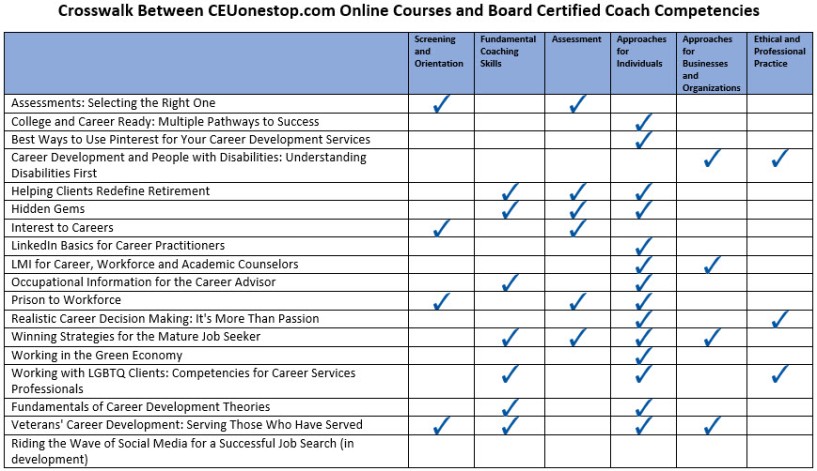 Maintaining Your Board Certified Coach Certification
Maintaining Your Board Certified Coach Certification
If you have obtained the certification from the Center for Credentialing and Education (CCE) called the Board Certified Coach (BCC) then you are aware of the fact that you must obtain 100 hours of continuing education related to the BCC competencies every 5 years.
CCE suggests that when deciding to obtain your continuing education that you consider the following questions:
- Does the content of the activity fall into one or more of the six BCC competencies?
- Is the activity geared to coaching?
- Does the activity enhance my role as a coach?
- Am I able to interact with the instructor/facilitator during or after the session?
- Will the activity be completed during my current five-year certification period?
- Does the instructor/facilitator have formal education, expertise or credentialing in the relevant BCC competency areas?
Working with the guidance of CCE, the chart below shows the relationship of the online, self-paced courses in career development from CEUonestop.com to the BCC competencies. The upshot is that these courses can count toward your recertification. Further, if you hold the career development specialty designation, CCE requires that 18 of your 100 hours must be taken in this specialty.

The courses are offered through CEUonestop.com, an NBCC approved continuing educator provider in career development. Visit the website to see more details about the courses, the instructional objectives, and the qualifications of our authors.
More details on the BCC competencies are listed below.
Board Certified Coach Competencies
-
Screening and Orientation: These coaching work behaviors focus on client motivation level, informed consent, coach and client roles, and general parameters for establishing the coaching process.
-
Fundamental Coaching Skills: These coaching work behaviors focus on the basic coaching alliance, helping skills, coaching plans and other essential issues concerning the coaching process.
-
Assessment: These coaching work behaviors assess coaching goals, client strengths and specific issues concerning the coaching process.
-
Approaches for Individuals: These coaching work behaviors pertain to specific skills aimed at facilitating the client’s desired goals during the coaching process including monitoring client progress, decision-making and use of resources.
-
Approaches for Businesses and Organizations: These coaching work behaviors include organization roles, change process, mentoring and conflict management related to the coaching process.
-
Ethical and Professional Practice: These coaching work behaviors focus on codes of ethics, advocacy, continuing education and personal barriers to the coaching process.

Pingback: Continuing Education to Maintain Your NCDA Designations | Thoughts About Career Development
Pingback: Workforce Development Certification: The CDWP | Thoughts About Career Development